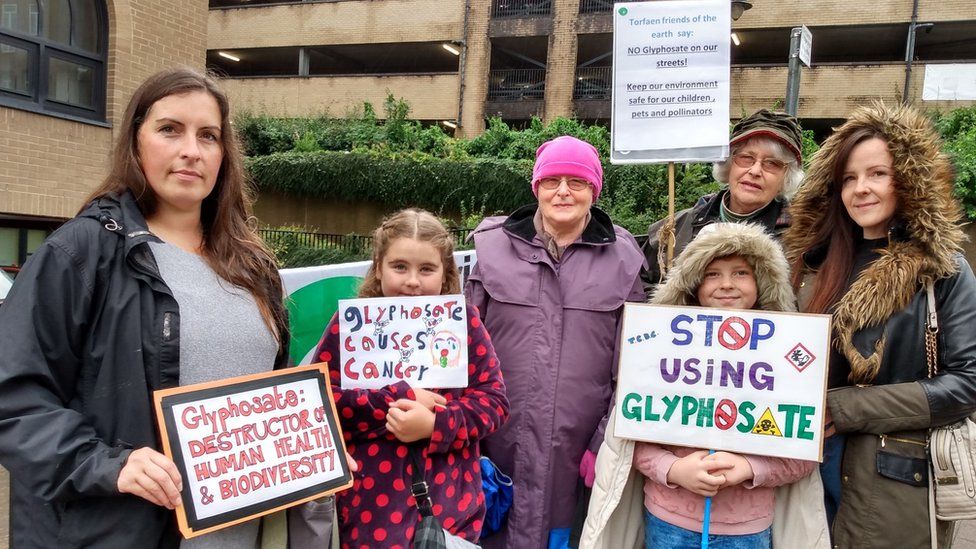Glyphosate: Calls to ban cancer-linked weedkiller in Wales
- Published

Campaigners are calling for the use of certain weedkillers near schools and play areas to be banned across Wales after their use was linked to cancer.
Last year a US jury found a glyphosate-based pesticide was a "substantial factor" in causing a man's cancer.
But while many councils have scaled-back the use of these weedkillers, BBC Wales found at least 10 still used them.
The Welsh Government said it aimed to reduce the use of chemical pesticides.
Some countries have banned the use of glyphosate-based herbicide, and some councils in England have stopped using it due to safety concerns.
While its use is approved by the EU, a number of petitions have been submitted by communities to councils across Wales urging them to stop using the chemical, with fears about the impact on residents, pets and wildlife.
One UN study reported the chemical - the active ingredient in most weedkillers - was "probably carcinogenic", but the European Food Safety Authority (EFSA) has said glyphosate was unlikely to cause cancer in humans.
Earlier this year, US chemical firm Bayer paid up to £8.8bn to settle cancer claims linked to one of the world's most-widely used weedkillers.
But the firm denies the glyphosate-based product causes cancer and has said the settlement will end a period of uncertainty.
In Europe, the EU licence for glyphosate is valid until December 2022. After Brexit, EU law which regulates the use of pesticides in the UK will continue to apply.
While Welsh ministers are able to make "relevant pesticide decisions" from 1 January, a new independent pesticide regulatory body will be set up in the UK.
'He could taste it in the air'
Last year, after seeing a notice for weed treatment works near her home in Cwmbran, Louise Kirby started a campaign to try and stop the council spraying pesticides.
Torfaen council is one of several in Wales which use glyphosate-based products to control weeds, and says it is used for the "spot treatment" of weeds.
But Ms Kirby said workers had been filmed spraying without protective equipment, driving around, spreading it over drains.
"[One of my friends] was walking his child to school and it was so strong he could taste it," she said.
"It has a cumulative affect on the body, and people are not necessarily aware of it, they are driving along spraying it on pavements and outside schools."
More than 1,000 people have now signed two separate petitions calling for the spraying to be stopped and residents have started an action group.
But after a report said its use was important to stop weeds becoming "trip hazards" and to stop the spread of Japanese Knotweed, the council voted to continue its use.
Councillors heard swapping to Foamstream - an eco friendly alternative - would cost 15 times more, but in a statement Torfaen said it had reduced the amount of glyphosate-based products in recent years.
With grass cutting reduced during the coronavirus pandemic, Ms Kirby had taken to tackling the weeds in her community by hand to try and stop chemicals being sprayed and is encouraging others to do the same.
The campaigners now want to see councils across Wales banned from using the chemicals.
Some councils say the use of the product is to control Japanese Knotweed, but a study suggests it cannot be eradicated by chemicals
BBC Wales asked all 22 councils if they still used glyphosate-based weedkiller in their areas.
Out of those who responded to our request - 10 councils - all said they still used it, but many had limited its use, or were looking at alternatives.
Vale of Glamorgan said it still used it in "certain situations", but it had stopped using herbicides in Green Flag parks and play areas since 2018 and used Foamstream.
Rhondda Cynon Taf and Cardiff said they had limited use of herbicides, while Powys said it no longer sprayed them in high-footfall areas.
Conwy council said it was looking at alternatives and had changed to a low-volume application system, while Gwynedd and Pembrokeshire said they used the chemicals but were looking into eco-friendly methods.
In Ceredigion, the council reviewed its use after nearly 200 people signed a petition, while in Wrexham the council has purchased a foam sprayer and use of herbicides had been stopped near schools.
In Merthyr and Monmouthshire, the councils said contractors had moved to more accurate and targeted spraying and they were considering other options.
The Welsh Government said it was consulting with other UK governments on a five-year-plan for more sustainable use.
"We are delivering a range of initiatives to reduce the usage of chemical pesticides in Wales," a spokeswoman said, pointing to projects to protect bees and nature areas.
"We are providing funding and support to local authorities and other land managers who use pesticides to adopt techniques and technologies that provide alternatives means of pest, disease and weed control."
- Published25 June 2020
- Published28 January 2020
- Published25 April 2018